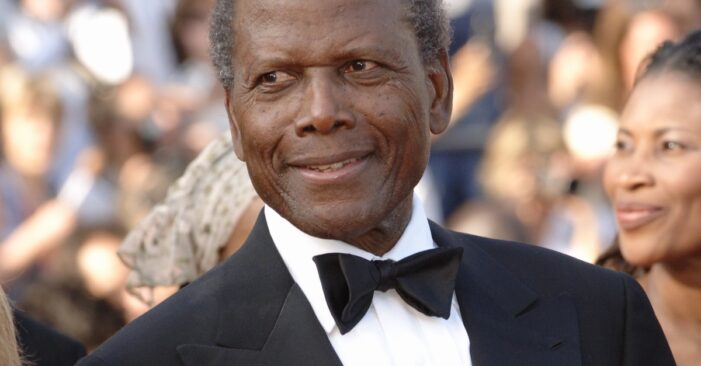Actor Sidney Poitier at the gala screening of “The Da Vinci Code” at the 59th Annual International Film Festival de Cannes. May 17, 2006 Cannes, France. 2006 Paul Smith / Featureflash (Shutterstock)
By Victoria Falk, Special to CAW
Mr. Sidney Poitier – pioneer, trailblazer, legend – passed away at age 94. He was best known for how he transformed Hollywood films. He not only changed the way Blacks were depicted in movies, but he also changed the way they were filmed. Before the rise of acclaimed actor Mr. Poitier, Blacks and Whites were filmed using basically the same lighting. According to public reports, during the 1967 production of In the Heat of the Night, cinematographer Haskell Wesler adjusted the lighting for Poitier so his features could be seen as clearly as those of his white cast members. Before that, the common practice was to use the same lighting when filming Black actors and White actors on the set, despite that this would cause a glare on the Black actors’ faces.
At the height of Mr. Poitier’s acting career, during the 1950s and 1960s, there was a scarcity of Black leading male actors. For decades, Blacks had been seen on the big screen in menial roles that perpetuated the negative stereotypes commonly held by society. However, Sidney Poitier was very selective in the parts he decided to take on. He refused to accept roles that negatively depicted Blacks. Instead, he typically played roles where the character was generally good and could articulate well. He played dignified characters.
In public reports, Sidney Poitier is commonly credited with helping break down the color barrier in Hollywood. He made history by breaking from the portrayal of stereotypes and using his roles to demonstrate the growth of the Civil Rights Movement, which was growing while Poitier was elevating in his acting career. Poitier starred in films that addressed racial issues and race relations, presenting challenges in his daily life.
Mr. Poitier was faced with bigotry from racist Whites and complaints from Blacks that he was a sellout. But Sidney Poitier was unmoved by the negativity and continued on his journey, which included supporting the Civil Rights Movement. Not only did Mr. Poitier participate in the 1963 March on Washington, but he also donated thousands of dollars to the cause. According to public reports, he also gave money to aid other Civil Rights volunteers. Reportedly, the late great Dr. Martin Luther King Jr. said of Sidney Poitier, “He is a man of great depth, a man of great social concern, a man who is dedicated to human rights and freedom.”
The activist and actor was the top Black actor during the 1950s and 1960s. He gained the respect of Blacks and Whites alike with the strong roles he played in films like The Defiant Ones, To Sir With Love, Guess Who’s Coming to Dinner, In the Heat of the Night, Lilies of the Field, A Raisin in the Sun, and Porgy and Bess. As noted in Wikipedia, in 1964, Sidney Poitier was the first African-American and first Bahamian to win the Academy Award for Best Actor and the Golden Globe for Best Actor for his role in Lilies of the Field. He also received a British Academy of Film and Television Award and a Grammy Award for Best Spoken Word Album.
Following that period, Mr. Poitier took a break from Hollywood for a few years. However, his hiatus did not make him any less effective in his abilities to get his message across. When Mr. Poitier returned to Hollywood, his movie roles continued to capture the attention of his fans. He also added television roles and directing to his repertoire. He directed several movies, including Buck and the Preacher with Harry Belafonte and Stir Crazy with Richard Pryor and Gene Wilder.
Mr. Poitier, once again, was recognized for being a master at his craft. He received the Golden Globe Cecil B. DeMille Award and the Screen Actor Guild’s Lifetime Achievement Award. He also received an Honorary Academy Award to recognize his accomplishments as an actor and humanitarian. But of all the awards and recognition Sidney Poitier received, the most outstanding recognition came from former President Barack Obama, who bestowed upon him the highest civilian honor in the United States – the Presidential Medal of Freedom. Mr. Obama said of Mr. Poitier, “…he not only entertained but enlightened…revealing the power of the silver screen to bring us closer together.”
In addition to great films, Mr. Poitier leaves behind Amazon’s top-selling books. Oprah Winfrey recognized Poitier’s work in her book club and featured “Life Beyond Measure: Letters to My Great-Granddaughter” and “The Measure of a Man.” One reviewer described “The Measure of a Man” as “an eye-opener” and “A great read.”
Oprah Winfrey reacted publicly to Sidney Poitier’s death, saying, “The Greatest of the ‘Great Trees’ has fallen. I treasured him. I adored him. He had an enormous soul I will forever cherish.”
The American-Bahamian actor, film director, author, and activist died of natural causes on January 6, 2022. Rest in peace, Mr. Sidney Poitier. We at Caribbean American Weekly offer our sincere condolences to the family, friends, and supporters of the late Sidney Poitier.

